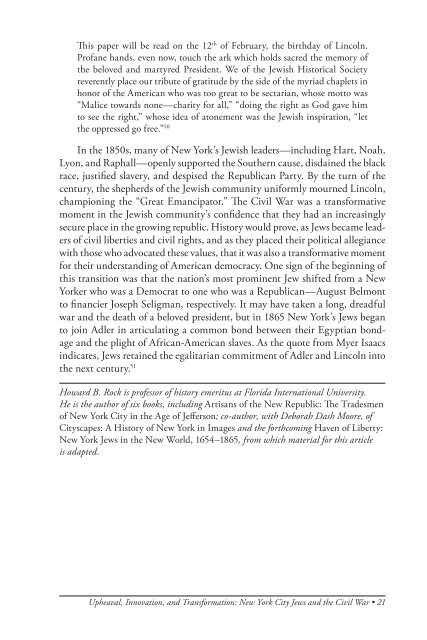American Jewish Archives Journal, Volume 64, Numbers 1 & 2
American Jewish Archives Journal, Volume 64, Numbers 1 & 2
American Jewish Archives Journal, Volume 64, Numbers 1 & 2
You also want an ePaper? Increase the reach of your titles
YUMPU automatically turns print PDFs into web optimized ePapers that Google loves.
This paper will be read on the 12 th of February, the birthday of Lincoln.<br />
Profane hands, even now, touch the ark which holds sacred the memory of<br />
the beloved and martyred President. We of the <strong>Jewish</strong> Historical Society<br />
reverently place our tribute of gratitude by the side of the myriad chaplets in<br />
honor of the <strong>American</strong> who was too great to be sectarian, whose motto was<br />
“Malice towards none—charity for all,” “doing the right as God gave him<br />
to see the right,” whose idea of atonement was the <strong>Jewish</strong> inspiration, “let<br />
the oppressed go free.” 50<br />
In the 1850s, many of New York’s <strong>Jewish</strong> leaders—including Hart, Noah,<br />
Lyon, and Raphall—openly supported the Southern cause, disdained the black<br />
race, justified slavery, and despised the Republican Party. By the turn of the<br />
century, the shepherds of the <strong>Jewish</strong> community uniformly mourned Lincoln,<br />
championing the “Great Emancipator.” The Civil War was a transformative<br />
moment in the <strong>Jewish</strong> community’s confidence that they had an increasingly<br />
secure place in the growing republic. History would prove, as Jews became leaders<br />
of civil liberties and civil rights, and as they placed their political allegiance<br />
with those who advocated these values, that it was also a transformative moment<br />
for their understanding of <strong>American</strong> democracy. One sign of the beginning of<br />
this transition was that the nation’s most prominent Jew shifted from a New<br />
Yorker who was a Democrat to one who was a Republican—August Belmont<br />
to financier Joseph Seligman, respectively. It may have taken a long, dreadful<br />
war and the death of a beloved president, but in 1865 New York’s Jews began<br />
to join Adler in articulating a common bond between their Egyptian bondage<br />
and the plight of African-<strong>American</strong> slaves. As the quote from Myer Isaacs<br />
indicates, Jews retained the egalitarian commitment of Adler and Lincoln into<br />
the next century. 51<br />
Howard B. Rock is professor of history emeritus at Florida International University.<br />
He is the author of six books, including Artisans of the New Republic: The Tradesmen<br />
of New York City in the Age of Jefferson; co-author, with Deborah Dash Moore, of<br />
Cityscapes: A History of New York in Images and the forthcoming Haven of Liberty:<br />
New York Jews in the New World, 1654–1865, from which material for this article<br />
is adapted.<br />
Upheaval, Innovation, and Transformation: New York City Jews and the Civil War • 21
















